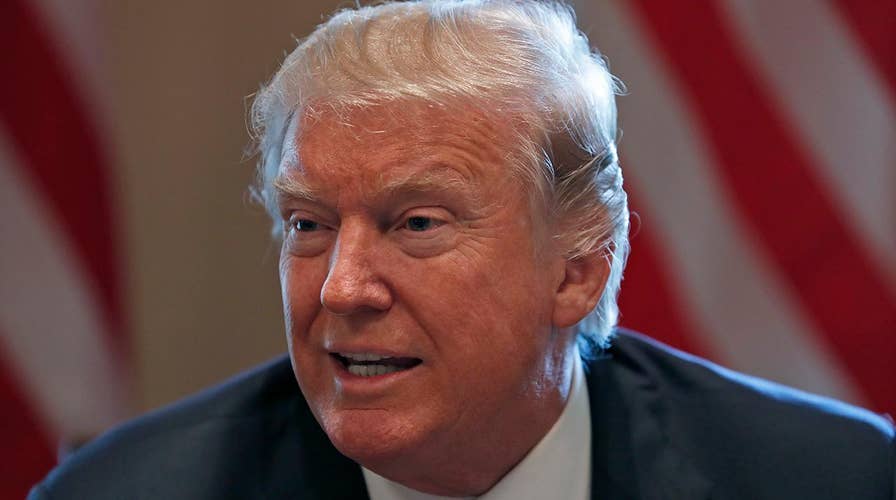President Trump: No deal on protection for 'Dreamers'
Conservatives don't want to compromise on DACA
Americans are having the wrong security conversation when it comes to the impact of immigration. We should be thinking about national security, not border security. The border can be secured without changing the level of legal immigration, but the nation’s strength has been (and will hopefully always be) built on millions of migrants coming to our shores.
The idea of reducing the number legal immigrants to America by half would have stunned founding fathers Thomas Jefferson and George Washington. Nudging out another 800,000 youthful DACA immigrants would have dropped their jaws. The president has lurched in different directions on this issue, but hopefully he and others that care about national security will see the smart bet is to favor more, not less, legal migration.
Restricting immigration to America was a centerpiece of imperial Britain’s King George to weaken our nascent republic, which is why it was emphasized in the Declaration of Independence. That document, as you may recall, was essentially a long list of grievances. The first six grievances concerned laws, legislation, and legislative authority, that “He” (King George) had overseen. But the seventh was about immigration:
He has endeavored to prevent the population of these states; for that purpose obstructing the laws for naturalization of foreigners; refusing to pass others to encourage their migration hither, and raising the conditions of new appropriations of lands.
To the founders, immigration was the key to power. More people increased economic growth and diversity. More people were also seen as the basis of military strength, as the historian Robbie Totten discovered in hundreds of historical speeches and letters from that era. In particular, state conventions to ratify the U.S. Constitution reveal an obsessive debate over ways to increase immigration, with constant references to the size of the militias and navy. In a similar fashion, state leaders from South Carolina to Pennsylvania competed to make their governments more accommodating to foreign migrants during the early years of the republic. Ironically, many legislators worried that too many of their states’ citizens would migrate even further to the frontier territories.
State conventions to ratify the U.S. Constitution reveal an obsessive debate over ways to increase immigration, with constant references to the size of the militias and navy.
Today, thanks almost entirely to the founder’s foresight, America is the wealthiest, most powerful nation in the world. Unfortunately, too much of a good thing makes one forgetful. And so today, people forget the benefits of free markets, free trade, low taxes, and even technological progress. And yes, they question immigration.
What do you suppose China fears when it looks across the Pacific at the United States? Not only the prosperity. China sees a country of over 323 million people, third largest among nations, and, more importantly, young. Not young like so many impoverished countries with high birth rates and early death rates. America’s families are thriving unlike the sclerotic nations of Europe, and also unlike the rapidly aging nations of Asia, including China itself. Migrants are a major reason why.
On a Wednesday morning in early August, speaking from a podium in the Roosevelt room with Senators Tom Cotton, R-Arkansas, and David Perdue, R-Ga., President Trump explained that he wanted to cut the annual rate of immigration from 1 million per year to 500,000 because it would help “minority workers competing for jobs against brand-new arrivals.” This makes sense if we think of immigration as a zero-sum game (between us the citizens versus them the immigrants) over jobs, wages, and welfare. Despite research showing that a dynamic economy simply doesn’t work that way, the instinct is understandable. But even if the lump-of-labor fallacy wasn’t a thing, the more important us-versus-them perspective is neither internal or economic. It’s foreign and martial.
Case in point: Albert Einstein was German. He fled the Nazis for Princeton, New Jersey. And thank God.
What if the United States had cut immigration by half starting in 1776? Our present population of over 323 million souls would be far lower. Using data from the U.S. Census starting with the year 1820 (population 9.6 million), I calculated an alternative history. Cutting immigration levels in half every year, thereby also reducing net future births, generates a modern U.S. population of 229,420,534. Basically, we would be without nearly one hundred million Americans. Looking back along the alternative historical timeline, that’s 32 million fewer people in 1940, and 65 million fewer in 1990.
Would the U.S. have won World War II (on one or both fronts) with a quarter fewer soldiers and sailors? Would it have been able to outgrow the Soviets or afford a Marshall Plan? Would it have dared to stop the communists in Korea in 1950?
To be sure, the foreign security situation that the U.S. faces in 2017 is significantly different than it faced in 1820 or 1776. But the simple math is the same. To the isolationist, the size of the U.S. population is irrelevant to the selfishly guarded fruits of fortress America. That is true. An isolationist policy would have cut immigration to zero in 1820, avoided foreign entanglements entirely, and survived to a present-day population of 137 million people, based on my calculations. With a population of that size, the U.S. today would be smaller than Bangladesh, larger than Germany, and about the same size as Mexico. It would have far fewer inventions and no navy, but a mighty fine border patrol.
To the traditionalist, America is not a fortress but rather an exceptional beacon of universal liberty, where immigration is vital to building the channels for positive change as well as increasing our military potential. What limits do we set on the national security of our grandchildren if we slash immigration now? It may be old school to think this way, but population is the foundation of power. Always has been and always will be.









































